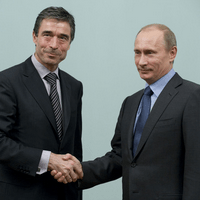During his first visit to Moscow as NATO's secretary-general, Anders Fogh Rasmussen outlined his vision of "a true strategic partnership" between Russia and NATO by 2020. Unfortunately, the Dec. 16-18 trip also highlighted persistent divisions between Russia and the West regarding NATO enlargement, Afghanistan, and other areas that present serious obstacles to Rasmussen's roadmap.
The high point of Rasmussen's visit was the speech he delivered at the Moscow State Institute of International Relations (MGIMO). In addition to foreshadowing the agenda items that will likely dominate NATO-Russia discussions in coming months, Rasmussen's remarks, entitled "NATO and Russia: Partners for the Future," offered an ambitious forecast of NATO-Russia relations for the year 2020:
Rasmussen offered few details about how best to achieve this transformation, aside from greater use of the NATO-Russia Council (NRC) and increased transparency in military strategy and doctrine. But he did point out the core reason for the persistent security tensions between Russia and the West: Many Russians continue to perceive the alliance as a security threat. He reassured his audience that, "NATO will never attack Russia . . . And we do not think Russia will attack NATO. We have stopped worrying about that and Russia should stop worrying about that as well." Rasmussen instead called on Russia to collaborate against such mutual threats as terrorism, proliferation, and Afghanistan, rather than "fighting the ghosts of the past."

